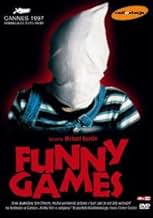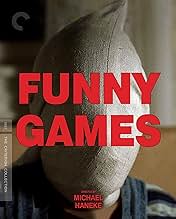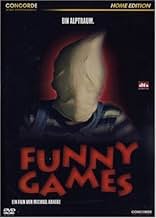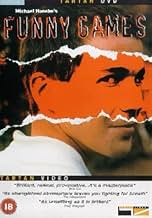दो हिंसक युवक एक माँ, पिता और बेटे को उनके अवकाश घर में बंधक बना लेते हैं और अपने बीमार मनोरंजन के लिए उन्हें विक्षिप्त खेलों के माध्यम से मनोवैज्ञानिक यातना देते हैं.दो हिंसक युवक एक माँ, पिता और बेटे को उनके अवकाश घर में बंधक बना लेते हैं और अपने बीमार मनोरंजन के लिए उन्हें विक्षिप्त खेलों के माध्यम से मनोवैज्ञानिक यातना देते हैं.दो हिंसक युवक एक माँ, पिता और बेटे को उनके अवकाश घर में बंधक बना लेते हैं और अपने बीमार मनोरंजन के लिए उन्हें विक्षिप्त खेलों के माध्यम से मनोवैज्ञानिक यातना देते हैं.
- पुरस्कार
- 5 जीत और कुल 9 नामांकन
फ़ीचर्ड समीक्षाएं
I think this movie attempts something virtually impossible, and probably only a German filmmaker would be interested in this particular problem. Watching film is intrinsically exploitive. Often the cinematic exaggeration of entering personal space results in violence. What about this?
An intelligent exploration of this problem from the viewer's side is "Clockwork Orange." Therapy in that case is forced viewing of a movie, presumably the exploration from the filmmaker's side. This is that movie.
Because it is about itself, it enters into a conspiracy of awareness about itself with the viewer. The intruders wink at the audience. Just before the movie begins the phase where it starts to shape up as a movie, that intruder remarks on it not yet being a movie. At one point, the action is "rewound" to be replayed with a different outcome.
It is all very clear. But the challenge is not to remark on the problem, but to say something interesting or new or useful about it. That may be impossible, at least with normal narrative techniques, so this exercise is something of a waste.
The one interesting thing for me is the white gloves. Most commenters assume this is to avoid fingerprints, which goes against every motive we see. As it is the only noticeable costuming, one must conclude it is to denote the cartoonish element.
Ted's Evaluation -- 2 of 3: Has some interesting elements.
An intelligent exploration of this problem from the viewer's side is "Clockwork Orange." Therapy in that case is forced viewing of a movie, presumably the exploration from the filmmaker's side. This is that movie.
Because it is about itself, it enters into a conspiracy of awareness about itself with the viewer. The intruders wink at the audience. Just before the movie begins the phase where it starts to shape up as a movie, that intruder remarks on it not yet being a movie. At one point, the action is "rewound" to be replayed with a different outcome.
It is all very clear. But the challenge is not to remark on the problem, but to say something interesting or new or useful about it. That may be impossible, at least with normal narrative techniques, so this exercise is something of a waste.
The one interesting thing for me is the white gloves. Most commenters assume this is to avoid fingerprints, which goes against every motive we see. As it is the only noticeable costuming, one must conclude it is to denote the cartoonish element.
Ted's Evaluation -- 2 of 3: Has some interesting elements.
I watched this year's remake of "Funny Games" prior to the original, simply because its sick-with-irony trailer got me extremely curious. Granted, this goes against my usual process of viewing a remake's precursor prior to the remake itself, but I couldn't help myself. By the end, I was astonished by writer-director Michael Haneke's audacity in telling a macabre home-invasion story devoid of Hollywood glamour, humor, and mercyremake or no, it's still one of the ballsiest exercises in visceral, reality-based horror ever released by a major studio.
So, when I decided to give the original "Funny Games" a spin (mere days after my viewing of American version), I was filled with presupposition toward how much I would appreciate the original (with the twists of Haneke's shot-for-shot remake still mapped out in my mind)similar to a sadistic "bet" our captors make with their prey, I was wondering if this earlier, German-language version would survive on its own terms. And, while each version is practically identical (save for some subtle nuances in the performances, the slightly varied location design, andof coursethe spoken language), both quite miraculously carry the same visceral, jaw-dropping sucker-punches as the other. Unlike the much-derided American remakes of "The Vanishing" and "Les Diaboliques," Haneke sees no need to let either culture off the hook, especially when each has its own prominent history of violence, on- and off-camera.
Ironically, the references to metalhead couch potatoes Beavis and Butt-Head probably seemed like an incendiary bitch-slap to the passive glamorization of American filmed violence in the 1997 version, but there is an even stronger sense of irony when the MTV-hosted duo are referenced in the remakeon the shores that birthed them, and the cult following of Generation Y-ers that has accumulated in the years since the show's cancellation (a sure sign that our passivity, if anything, is more pronounced now). It's subtle observations like this that give both versions of "Funny Games" an added resonance.
If anything takes some getting used to in the 1997 film, it's the general unfamiliarity of the cast. After seeing a collection of familiar performers run through Haneke's horrifying 2008 experiment, the German cast begins with a studied approach to the performances that eventually loosens into hysteria and desperation that is just as convincing as their remake counterparts. It is truly stunning how Haneke mines the same static framing and intense performances to ends that are equally effective in both films (even knowing the outcome of a protracted long take following a pivotal off-screen event, I found the experience just as emotionally agonizing to witness).
While it may seem hypocritical to "side" with Haneke (at least in the context his film creates), especially when I patronize (and am prone to enjoying) films that frequently downplay the reality of human suffering, the effect in both versions of "Funny Games" is undeniably powerfulthese are difficult, ugly, and emotionally draining films crafted with undeniable (and remarkably subtle) purpose. If there's any catharsis to be had from them, it will be in the introspection and assessment of your own attitudes toward violence.
So, when I decided to give the original "Funny Games" a spin (mere days after my viewing of American version), I was filled with presupposition toward how much I would appreciate the original (with the twists of Haneke's shot-for-shot remake still mapped out in my mind)similar to a sadistic "bet" our captors make with their prey, I was wondering if this earlier, German-language version would survive on its own terms. And, while each version is practically identical (save for some subtle nuances in the performances, the slightly varied location design, andof coursethe spoken language), both quite miraculously carry the same visceral, jaw-dropping sucker-punches as the other. Unlike the much-derided American remakes of "The Vanishing" and "Les Diaboliques," Haneke sees no need to let either culture off the hook, especially when each has its own prominent history of violence, on- and off-camera.
Ironically, the references to metalhead couch potatoes Beavis and Butt-Head probably seemed like an incendiary bitch-slap to the passive glamorization of American filmed violence in the 1997 version, but there is an even stronger sense of irony when the MTV-hosted duo are referenced in the remakeon the shores that birthed them, and the cult following of Generation Y-ers that has accumulated in the years since the show's cancellation (a sure sign that our passivity, if anything, is more pronounced now). It's subtle observations like this that give both versions of "Funny Games" an added resonance.
If anything takes some getting used to in the 1997 film, it's the general unfamiliarity of the cast. After seeing a collection of familiar performers run through Haneke's horrifying 2008 experiment, the German cast begins with a studied approach to the performances that eventually loosens into hysteria and desperation that is just as convincing as their remake counterparts. It is truly stunning how Haneke mines the same static framing and intense performances to ends that are equally effective in both films (even knowing the outcome of a protracted long take following a pivotal off-screen event, I found the experience just as emotionally agonizing to witness).
While it may seem hypocritical to "side" with Haneke (at least in the context his film creates), especially when I patronize (and am prone to enjoying) films that frequently downplay the reality of human suffering, the effect in both versions of "Funny Games" is undeniably powerfulthese are difficult, ugly, and emotionally draining films crafted with undeniable (and remarkably subtle) purpose. If there's any catharsis to be had from them, it will be in the introspection and assessment of your own attitudes toward violence.
A pair of polite, bland-ish German teenagers encounter a woman, her husband and son in a remote lakeside cottage, then spend the night terrorizing them with "funny games." The set-up is identical to that of Elia Kazan's THE VISITORS, both versions of DESPERATE HOURS, and many other claustrophobic thrillers; but the feeling of the picture is that of a hundred-minute-long extended dance remix of the ear-slicing in RESERVOIR DOGS. The writer-director Michael Haneke has one ace up his sleeve: the handsomer of the two sociopaths is given asides to the camera, on the order of, "You are on their side, aren't you?"
The point of all this, apparently, is that the audience is implicated in the action, because we, as pop-culture consumers, consume torture and protracted murder as entertainment. But there's a flaw in Haneke's logic: the only time we consume torture and protracted murder as entertainment is in recondite European art films like I STAND ALONE, MAN BITES DOG, and FUNNY GAMES.
This is the kind of picture that gets bluenose types all huffy, and prone to pronouncements on the order of, "This is the most repellent movie ever made!" I'll stay off that high horse--but I will say, a few hours after seeing the picture, that there is something singularly loathsome in the hypocrisy of Haneke's coating a suspenseless piece of fictional snuff porn in the sanctimony of its being a Statement on Violence and Media. Haneke makes the victims as dull and uncharacterized as the victors; removes just about any plausible means of escape or table-turning; and subtracts any reason for us to care about the outcome, except our desire not to witness hideous suffering. What's left--an orgy of S&M-like abuse--certainly does make the audience squirm. But so what? So would a videotape of anonymous torture, or the capture and abuse of an animal. FUNNY GAMES doesn't exist on a political or philosophical level (like I STAND ALONE); its attempts at mordant humor are collegiate (unlike MAN BITES DOG); it certainly doesn't hold up a mirror to a junk-food culture (like NATURAL BORN KILLERS). It's a wallow. And you know what side the filmmakers are on when one of the sadists terrifies a little kid by slipping on a CD in a neighbor's house the kid has escaped to, and the music is that well-known favorite of middle-aged bourgeois people on vacation...John Zorn and the Naked City.
This kind of Extreme Cinema has worked much better when practiced by artists in totally disreputable sub-pulp forms--like Lucio Fulci and Ruggero Deodato, whose sometimes almost unwatchable films engage in a spiritual wrestling match between the desire to go to the limits, and the conscience that watches over the mayhem. I was shocked to discover that Haneke is nearly sixty--this picture has the sensibility of a kid turned on by the autopsy pictures at Amok Books. As he sticks bamboo under our fingernails, your mind is so unoccupied it asks other questions. Like: Why would any sane family entertain for a minute two young strangers wearing fingerprint-proof gloves in the middle of summer? And: Is the actress playing the mother this terrible because no one else would take such a degrading role?
The point of all this, apparently, is that the audience is implicated in the action, because we, as pop-culture consumers, consume torture and protracted murder as entertainment. But there's a flaw in Haneke's logic: the only time we consume torture and protracted murder as entertainment is in recondite European art films like I STAND ALONE, MAN BITES DOG, and FUNNY GAMES.
This is the kind of picture that gets bluenose types all huffy, and prone to pronouncements on the order of, "This is the most repellent movie ever made!" I'll stay off that high horse--but I will say, a few hours after seeing the picture, that there is something singularly loathsome in the hypocrisy of Haneke's coating a suspenseless piece of fictional snuff porn in the sanctimony of its being a Statement on Violence and Media. Haneke makes the victims as dull and uncharacterized as the victors; removes just about any plausible means of escape or table-turning; and subtracts any reason for us to care about the outcome, except our desire not to witness hideous suffering. What's left--an orgy of S&M-like abuse--certainly does make the audience squirm. But so what? So would a videotape of anonymous torture, or the capture and abuse of an animal. FUNNY GAMES doesn't exist on a political or philosophical level (like I STAND ALONE); its attempts at mordant humor are collegiate (unlike MAN BITES DOG); it certainly doesn't hold up a mirror to a junk-food culture (like NATURAL BORN KILLERS). It's a wallow. And you know what side the filmmakers are on when one of the sadists terrifies a little kid by slipping on a CD in a neighbor's house the kid has escaped to, and the music is that well-known favorite of middle-aged bourgeois people on vacation...John Zorn and the Naked City.
This kind of Extreme Cinema has worked much better when practiced by artists in totally disreputable sub-pulp forms--like Lucio Fulci and Ruggero Deodato, whose sometimes almost unwatchable films engage in a spiritual wrestling match between the desire to go to the limits, and the conscience that watches over the mayhem. I was shocked to discover that Haneke is nearly sixty--this picture has the sensibility of a kid turned on by the autopsy pictures at Amok Books. As he sticks bamboo under our fingernails, your mind is so unoccupied it asks other questions. Like: Why would any sane family entertain for a minute two young strangers wearing fingerprint-proof gloves in the middle of summer? And: Is the actress playing the mother this terrible because no one else would take such a degrading role?
I don't know what to rate this. Although I can appreciate what Haneke was going for, the morally condescending tone didn't work for me. While you could write a book on the topic, I'll keep my thoughts short: humans have a fundamental craving for violence, and I can differentiate violence in media from violence in reality. His message just ended up falling flat. There wasn't any deeper criticism of violence and I didn't walk away feeling wrong or like I should have a new perspective on the matter. Yet I still didn't dislike it... The film was expertly crafted for his intentions, was adeptly acted, and I was kept engaged. Does that make me his target? Is it just pretentiousness? I'm not sure.
6.4/10
6.4/10
First things first, Michael Haneke HATES Quentin Tarantino's films. He hates the way violence and death are shown as being 'cool' - Cool gangsters executing their enemies whilst saying cool lines (And you will know, that my name is the Lord! etc,etc)with a cool song playing in the background. This is not how violence is in the real world, violence is a horrible fact of life, not a glamourous thing for youths to copy, and I think Haneke intended Funny Games to show it how it really is. I watched Funny Games without the slightest clue what the film was about, so I just had to sit back and take it as it comes. At first, I wasn't too impressed. I thought the scenes were too long and dragged out, yet at the same time, I felt a strange feeling of suspense. The incredibly long camera shots leave you that bored, that you think "Something bad is going to happen soon, I can tell...". The suspense also lasts right through the film 'til the very end. You don't want to watch it, but at the same time, you feel hypnotised by it.
I will not detail any events of the film, to save spoiling the atmosphere, but I will note one thing that people tend to be confused about:- "Why did the family let them into the house in the first place?" The two characters of Peter and Paul are let to walk all over the family because of one flaw in the bourgios psyche - 'The more polite a person is, the better a person they are.' This absurd way of thinking is played on by Peter and Paul and they obviously score, plus 'getting into the house without breaking in' is also one of their 'games'.For those who haven't seen the film, I definitely wouldn't recommend this for a night in with the parents/girlfriend, but I definitely would for people who want to see the difference between death and Tarantino-glam. Prepare for a highly suspenseful yet sickeningly violent, non-Hollywood, edge-of-the-seat piece of art. 8/10
I will not detail any events of the film, to save spoiling the atmosphere, but I will note one thing that people tend to be confused about:- "Why did the family let them into the house in the first place?" The two characters of Peter and Paul are let to walk all over the family because of one flaw in the bourgios psyche - 'The more polite a person is, the better a person they are.' This absurd way of thinking is played on by Peter and Paul and they obviously score, plus 'getting into the house without breaking in' is also one of their 'games'.For those who haven't seen the film, I definitely wouldn't recommend this for a night in with the parents/girlfriend, but I definitely would for people who want to see the difference between death and Tarantino-glam. Prepare for a highly suspenseful yet sickeningly violent, non-Hollywood, edge-of-the-seat piece of art. 8/10
क्या आपको पता है
- ट्रिवियाUlrich Mühe and Susanne Lothar, who play the father and mother, were a couple in real life from this movie until Mühe's death in 2007.
- गूफ़When Anna and Georg are driving in their car, the reflection of a microphone between the front seats can be seen on the window.
- क्रेज़ी क्रेडिटThe front credits list "music by" several classical composers and John Zorn. Given the director's outspoken views on modern media, including the "composer" of the hardcore "thrash metal" songs alongside the likes of Handel and Mozart is part of his message.
- कनेक्शनFeatured in The Last Days of the Board (1999)
- साउंडट्रैकCara Salva
from 'Atalanta'
Music by George Frideric Handel (as G.F. Händel)
Sung by Beniamino Gigli
Published by EMI DA 1918
टॉप पसंद
रेटिंग देने के लिए साइन-इन करें और वैयक्तिकृत सुझावों के लिए वॉचलिस्ट करें
- How long is Funny Games?Alexa द्वारा संचालित
विवरण
- रिलीज़ की तारीख़
- कंट्री ऑफ़ ओरिजिन
- आधिकारिक साइट
- भाषाएं
- इस रूप में भी जाना जाता है
- Juegos divertidos
- फ़िल्माने की जगहें
- उत्पादन कंपनियां
- IMDbPro पर और कंपनी क्रेडिट देखें
बॉक्स ऑफ़िस
- दुनिया भर में सकल
- $1,266
- चलने की अवधि1 घंटा 48 मिनट
- रंग
- ध्वनि मिश्रण
- पक्ष अनुपात
- 1.85 : 1
इस पेज में योगदान दें
किसी बदलाव का सुझाव दें या अनुपलब्ध कॉन्टेंट जोड़ें




























